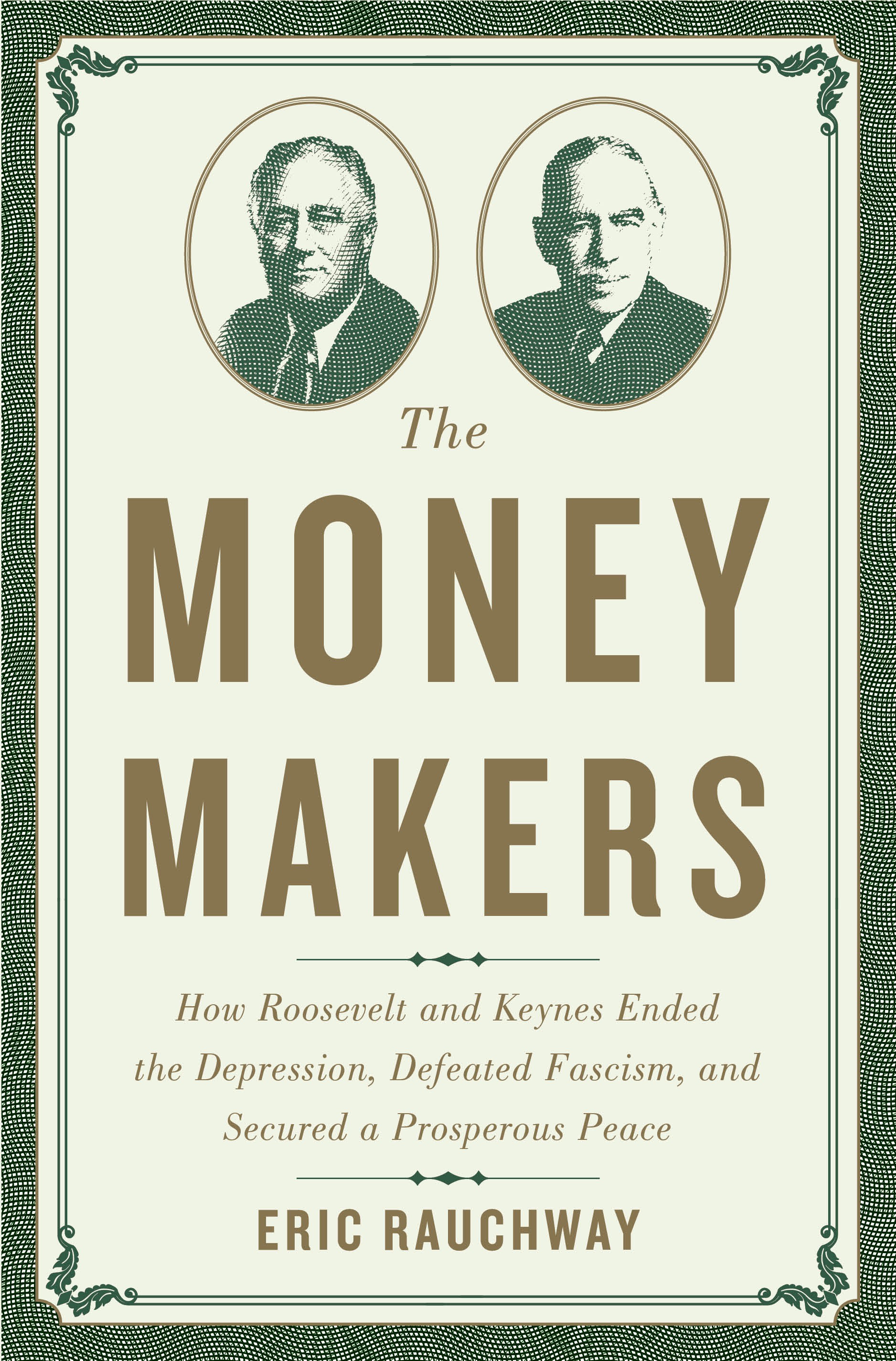The estimable Heather Cox Richardson sympathizes with George Will in his despair over Bill O’Reilly’s book, Killing Reagan. Will decries “today’s cultural pathology of self-validating vehemence with blustery certitudes substituting for evidence.”
Posts by author:
eric
In The New Republic, Jeet Heer says that Donald Trump is not a populist, he’s “the voice of aggrieved privilege—of those who already are doing well but feel threatened by social change from below, whether in the form of Hispanic immigrants or uppity women.” Or the voice of the white American man enraged at the possibility he might lose his ill-gotten privilege. Heer doesn’t use the f-word, but it’s the elephant in the room.

For the alleged misunderstanding of Trumpism as “populism,” Heer blames the historian Richard Hofstadter, who in the middle 1950s explained he was interested in “that side of Populism” that sounded to Hofstadter a lot like McCarthyism. Hofstadter was right: there was a side of Populism, and not a trivial side, that sounded like McCarthyism—and Trumpism too. [click to continue…]
Ronald Reagan in “A Time for Choosing,” the Gipper’s speech for Barry Goldwater in 1964:
Welfare spending [is] 10 times greater than in the dark depths of the Depression. We’re spending 45 billion dollars on welfare. Now do a little arithmetic, and you’ll find that if we divided the 45 billion dollars up equally among those 9 million poor families, we’d be able to give each family 4,600 dollars a year. And this added to their present income should eliminate poverty.
David Brooks in the New York Times, regarding the case of Freddie Gray in 2015:
The problem is not lack of attention, and it’s not mainly lack of money. Since 1980 federal antipoverty spending has exploded. As Robert Samuelson of The Washington Post has pointed out, in 2013 the federal government spent nearly $14,000 per poor person. If you simply took that money and handed it to the poor, a family of four would have a household income roughly twice the poverty rate.
Annie Lowery points out why Brooks’s argument is numerically bogus: just as conservatives don’t count millions of government employees as employed in 1930s, Brooks doesn’t count federal money as money in the 2010s:
Brooks is claiming that federal spending on anti-poverty programs is not lifting families out of poverty… when the government specifically does not include the value of those very programs in its poverty calculations.… A fuller accounting shows that food stamps alone lift 4 million people above the poverty line. The earned-income tax credit lifts nearly 6 million above it. Which is to say that “not bringing down the official poverty rate” is not a good yardstick by which to judge these programs.
But I would like to take David Brooks up on his suggestion: with the absolute same degree of sincerity as 1964-era Reagan, he’s supporting a straight-up transfer of wealth from the rich to the poor. It is a radical solution to poverty, this long-standing Republican proposal, but perhaps one that we should consider.
 |
With Abenesia in the news, I thought it might be useful to talk about another Axis nation’s complicated struggle with the memory of the Second World War. Jennifer Teege found out, at the age of 38, that not only was her grandfather a Nazi, he was an especially infamous Nazi: Amon Goeth, the commandant of PÅ‚aszów concentration camp, the man played by Ralph Fiennes in Schindler’s List. On trial after the war, Goeth sneered at the witnesses against him, “What? So many Jews? And we were always told there’d be none left.” He gave a Hitler salute on the gallows.
Hence the title of Teege’s memoir: she has an African father, and a Nazi grandfather who would have regarded as subhuman a person of African descent. The book is a great deal subtler than the title suggests. It is saturated in memory, and forgetting, and the fault lines between memory and history run throughout it. Teege describes her attempt to reconcile what she learns about her grandfather with the kind – but, she now knows, complicit – grandmother she remembers. The book presents Teege’s reminiscence and necessarily somewhat therapeutic work alongside the sober, reportorial voice of Nikola Sellmair, whose dry factual rendering of verifiable history often undermines Teege’s hopeful, emotional writing.
There are different kinds of memory in the book. Teege’s adoptive German family had a more usual relationship to the Nazi era – her father didn’t really know the extent to which his family had taken part in Nazi crimes. Sellmair discusses such modern Germans, summarizing Harald Welzer’s study “Grandpa Wasn’t a Nazi.” Latter day Germans seize on any opportunity to construct a guiltless, even noble past for their forebears – as with the French, they were all in the resistance.
Teege’s brief narrative also encompasses also the memory kept by Holocaust survivors and their descendants: before Teege found out about her grandfather, she traveled to Tel Aviv, made friends there, and lived there. Her discovery imposes silence between her and her Jewish friends. She doesn’t know what she can say. Her grandfather might have shot their grandparents.
“There is no Nazi gene,” Teege insists, struggling against the idea that she must bear some guilt for her grandfather. But she clearly feels that guilt. We all inhabit the world the bloodthirstiest conquerors made; only some of us grew up with them, personally.
 |
|
| Now, or recently, at newsagents |
In the TLS for 17 April, you can find my essay on Nicholas Wapshott’s The Sphinx, about the presidential election of 1940, the isolationists, and how Franklin Roosevelt engineered the US shift toward war. The essay starts like this:
Franklin Roosevelt recognized the threat Adolf Hitler posed from the moment of the German Chancellor’s appointment. In January of 1933, Roosevelt—not yet inaugurated, though already elected, President—told an aide that Hitler’s ascent was “a portent of evil”, not just for Europe but “for the United States”. He “would in the end challenge us because his black sorcery appealed to the worst in men; it supported their hates and ridiculed their tolerances; and it could not exist permanently in the same world with a system whose reliance on reason and justice was fundamental:. From then onward, Roosevelt’s policies raced Hitler’s: the New Deal was not merely a programme for recovery from depression, but one to rebuild economic strength while preserving democracy in the United States so the nation would be ready to fight Nazism when the time came.
The New Deal gave Americans not only the material capacity to fight fascism, but faith in American institutions. Which is why, of course, the prevalence of remarks like this one remains so appalling.1
1Despite John’s extensive work; e.g.
Paul Campos writes in the New York Times about what he claims is the “real reason” for higher college tuition in the USA:
far from being caused by funding cuts, the astonishing rise in college tuition correlates closely with a huge increase in public subsidies for higher education.… a major factor driving increasing costs is the constant expansion of university administration
And he singles out the California State University (CSU) system as an example:
while the total number of full-time faculty members in the C.S.U. system grew from 11,614 to 12,019 between 1975 and 2008, the total number of administrators grew from 3,800 to 12,183 — a 221 percent increase
 |
|
| Forthcoming in September, from Basic Books |
As readers of this blog know, Franklin Roosevelt declared he had taken the US off the gold standard on March 6, 1933, as the first substantial act of his presidency. But scholars have not been so quick to accept this date or, with firmness, any other.
When Roosevelt first said he had taken the US off the gold standard, he didn’t want to make too great a fuss about it because he was trying to quiet a panic that had nearly broken the Federal Reserve System. He hoped Americans would bring their gold back for deposit in the nation’s vaults. And they did. Even though the papers were reporting that the president might issue scrip for temporary currency; even though the Emergency Banking Act provided that Federal Reserve notes could be backed by commercial bank assets, people generally preferred paper money to gold, so long as they trusted the paper money – which, with Roosevelt’s assurances, they did, as you can see from the chart. [click to continue…]
 |
|
| Forthcoming in September, from Basic Books |
On this day in 1933, it was the first Friday of Franklin Roosevelt’s administration, and the new president met reporters to talk to them about ending the bank holiday with which he had begun his term. The Federal Reserve Banks would open on Saturday so that member banks of the Federal Reserve System could open on Monday. A reporter asked if the banks would be open “[a]ll along the line, Mr. President; that is, all functions?” Roosevelt replied, “Yes, all functions. Except, of course, as to gold. That is a different thing. I am keeping my finger on gold.”
The president’s week had started with his inauguration on March 4, the previous Saturday, when he had told the American people they had only fear itself to fear, and promised them an “adequate but sound currency.” The next day Roosevelt worked all through the day with members of his team and holdovers from Herbert Hoover’s to draft orders to close the banks and halt all payouts of gold. They worked so hard that Sunday that it was late by the time the order was ready for presidential signature – so late that Federal Reserve counsel Walter Wyatt urged the president to wait a little longer to sign, so that it would be Monday, and not so sacrilegious. Roosevelt did wait, and then, on signing the order said – gleefully, according to one account – “We are now off the gold standard.” That was in the wee hours of March 6; later that morning, Americans began a week of doing business without access to banks.
I recently re-watched Do the Right Thing and found the ending a little shocking. No, not the violent part – which has, sadly, only become more familiar in the quarter century since 1989 – but the actual last scene.
I write to record a position on a subject already treated in more specialist fora, but so far as I can tell given only Kieran’s crispest disposal on CT.
I refer, of course, to a matter routinely, if implicitly, raised by the auditors of curricula, every time they ask for samples of a syllabus: if they request more than one, what do they say they want? Syllabi? Or syllabuses?1
Doubtless this issue vexes few of the hoi polloi, nor troubles many alumni of great universities. Indeed, academics – from the Hebrides to the Antipodes – seem often to use “syllabi.”
A highly scientific anti-prescriptivist study has it that the answer is “syllabi.” Yet Kieran, per above, prefers “syllabuses,” as indeed do I.
If your etymological antennae are twitching, you can find a detailed account of the story of “syllabus” at the specialist links in the first sentence of the post. But the short version is, it’s a made-up word, erroneously thought to be adopted into Latin from the Greek, which it wasn’t. I.e., there isn’t a true proper correct answer, horribile dictu.
1I’ve never actually heard anyone insist it’s syllabÅ«s.
For my new book, I spent long hours trawling through the many, many reels of the microfilmed diaries of Henry Morgenthau, Jr. We didn’t have them at my university, so I had to order a few at a time from Interlibrary Loan, wait, and then seize upon them and go through them before they were due back at their home institution. Working through them at that speed, and on the microfilm reader whose lens & screen combination wasn’t quite right to show a full page, invariably gave me motion sickness.
Then they showed up, digitized, free to download. The joke was on me.
Except, for some reason, the digitized edition seems to begin with Book 1. Which you would think was okay – except the first book is actually Book 00. And that’s the book that covers the beginning of the Roosevelt administration, which was a critical period during which decisions were made about monetary policy that lasted for the duration of Roosevelt’s terms in office.
A peril, perhaps, of the digital archives.
California’s measles outbreak has now reached more than 70 cases. 1
Populations especially at risk are those born after 1957 and vaccinated between 1963-1967 or not vaccinated. People born before 1957 would have been exposed to measles naturally and are ok; those not exposed to the virus in the wild will be vulnerable. People vaccinated 1963-1967 might have got the “killed virus” vaccine, which the Centers for Disease Control now say is ineffective, and they will be vulnerable.
Unvaccinated people will be vulnerable2 for what ought to be obvious reasons.
California permits unvaccinated students to enroll in public schools if their parents file a form saying their beliefs do not permit vaccination.
The percentage of unvaccinated students in Sacramento-area schools is over fifty percent in some cases.
As the historian Robert Johnston remarks, scholars used to treat anti-vaccination activists as “the deluded, the misguided, the ignorant, the irrationally fearful” but now they command ‘If not sympathy, at least a modicum of respect.”
I suppose we should respect those whom we can rationally fear.
1This is the outbreak that the press keep saying, correctly if punctiliously, began at “Disneyland Park and Disneyland California Adventure,” as if there were some important meaningful reason they couldn’t say “Disneyland”; Disneyland is offering a pretty good discount right now, by the way.
2Rich Puchalsky, I think correctly, points out in comments that all are potentially vulnerable once we drop below a percentage where we have “herd immunity.”
We took the kids to see Selma, and I think you should see it too. (I mean, my God: it’s got both Stephen Root and Wendell Pierce.) Its historical liberties notwithstanding, it’s a great piece of historical fiction. As a sometime practitioner of both history and historical fiction, let me explain why.
The hott podcast Serial concluded this week with its twelfth episode, an episode that crystallized for me why I like it. For all the complaints – that it is white privilege in distilled radio form; that it is really about its host, Sarah Koenig – it is a pretty good dramatization of the historical process.
And it’s not only because this week one of the intrepid reporter/producers descended into an actual archive to retrieve a critical document and, despite some gratuitous mockery of the archivists, gave a sense of what it’s actually like to do that and why you would want to.
It’s ultimately because Koenig held herself to a standard of argument that’s similar to what historians use. She repeatedly questioned herself as she pursued her research over the course of months; she tried to disprove her hunches even as she followed them, and ultimately concluded with “what we know” – which is distinct from “what really happened” (yes, she goes all Ranke on us).
Here’s how she ends (SPOILERS):
André Singer (the documentarian who made The Act of Killing) appeared on Radio 4’s Front Row yesterday to talk about his new documentary, Night Will Fall, a film about yet another documentary – this one the previously unreleased German Concentration Camps Factual Survey, the film produced by the Ministry of Information in 1945 to record what became known as the Holocaust.
German Concentration Camps Factual Survey, produced by Sidney Bernstein with help from Alfred Hitchcock and a script by Richard Crossman and Colin Wills, was commissioned by SHAEF in April 1945 and meant to be shown to Germans immediately after the war. [click to continue…]